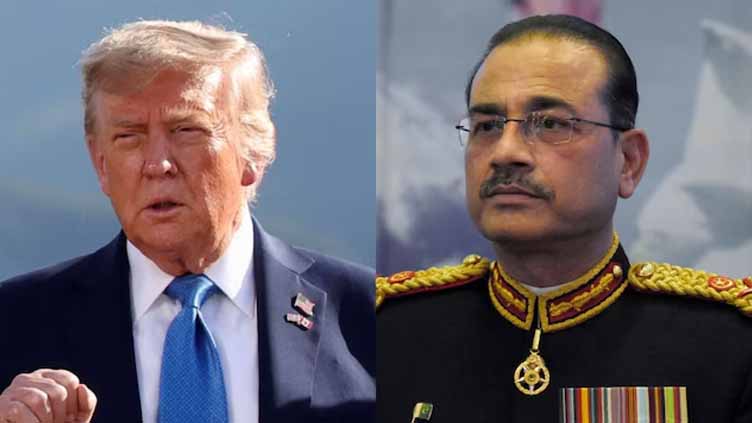Field Marshal Asim Munir's meeting with President Trump redefines Pak-US relations
Pakistan
High-level meeting underscores Pakistan's effective role in region
Field Marshal was unaccompanied by any member from civilian leadership from Islamabad
Meeting reflects the rising international prominence of Pakistan
Both sides acknowledged the need for sustained collaboration in a rapidly evolving geopolitical environment
By Ahad Khan
In an unprecedented and unanticipated diplomatic move, Field Marshal Syed Asim Munir became the first Chief of Army Staff in Pakistan’s history to hold a face-to-face meeting with a sitting US President at the White House – unaccompanied by any member from civilian leadership from Islamabad.
The landmark meeting was unconventional by all means, as a serving Pakistani army chief was formally welcomed at this high level of engagement, distinctively, without any political portfolio or having authority under martial law.
This event represents a pivotal moment in the US-Pakistan relations and reflects the rising international prominence of Pakistan.
Pak-US relations under Field Marshal Asim Munir
Before we delve deeper, let’s take a brief overview of how US-Pakistan relations have evolved under the leadership of Pakistan’s military chief, Field Marshal Asim Munir.
General Asim Munir’s maiden visit to the United States as an army chief in December 2023 marked a notable advancement in US-Pakistan military and diplomatic relations, reflecting a strategic recalibration of partnership with the superpower.
During that visit, the army chief had held extensive meetings with senior US defense and security officials, including the commander of the US Central Command (Centcom) Gen Michael Erik Kurilla and then Secretary of State Antony Blinken and Secretary of Defense Lloyd Austin.
At the conclusion of that visit, both sides acknowledged the need for sustained collaboration in a rapidly evolving geopolitical environment.
A US congressional delegation also visited Pakistan a couple of months ago which called on Field Marshal Asim Munir at the General Headquarters (GHQ) in the garrison city, Rawalpindi.
US-Pak ties after Trump’s return to White House
Now if we look into US-Pak relationship’s renewed trajectory after President Donald Trump’s return to the White House, the first among the many breaths of fresh air for Pakistan came when in February this year, the Trump administration lifted the freeze on $397 million in funding for a US-backed programme in Pakistan, aimed at ensuring that American-made F-16 fighter jets are used solely for counterterrorism operations.
The second recognition for Pakistan’s pivotal role in fighting the war on terror came directly from US President Trump when he revealed during his first congressional address that the person responsible for killing 13 US service members during the withdrawal from Afghanistan in 2021 had been arrested with the help of Pakistan and was now on his way to the United States to face justice.
Third acknowledgement came from top military leader of the Centcom commander General Kurilla when he praised Pakistan as a “phenomenal partner in the world of counterterrorism”, citing the South Asian country’s war against separatist elements in Balochistan and groups like the Islamic State-Khorasan (IS-K).
And now after Trump’s high-powered meeting with Field Marshal Munir in the White House, for which he thanked him for stopping the war against India and apparently sought his support to defuse tensions by playing his role as the neighbour of Iran to avoid hurtling towards further clash between Iran and Israel.
Multiple aspects of relationship
Senior analyst on South Asian Affairs, Michael Kugelman said the Trump-Munir meeting shouldn’t be seen only through the lens of the Israel-Iran war. “There’s been US-Pak engagement on critical minerals, crypto, [and] CT,” he said. “Trump takes a deep personal interest in all of these. And Munir is empowered to talk about it all. Also, Kashmir,” he further elaborated.
Key takeaways from Trump-Munir meeting
Having touched upon significant events and following aspects, we can have four takeaways from this high-level between President Trump and Field Marshal Munir meeting.
1) US still trusts Pakistan’s military leadership in joint counterterrorism ventures and seeks its support in resolving complex regional security issues.
2) Timing of this meeting further strengthens Field Marshal Munir’s position domestically as well as in the volatile region.
3) There seems to be no room of any relief for former premier Imran Khan whose party’s foreign lobbyists had pinned false hopes of any sort of US interference in getting him out of jail.
4) All these developments have certainly riled up India, which seems left-out under current circumstances.
In final analysis, India has started to creak under the weight of its own fragile hubris which has been reduced to rubbles in the recent clash with Pakistan.
Thanks to President Trump, who announced ceasefire between India and Pakistan through a tweet on X (formerly twitter).
Things could have gone different otherwise.



